Root Canal Therapy
Root canal therapy is one of those treatments at the dentist that most people are confused about and at North Sydney Dentistry we are not surprised. There are multiple steps, a couple of appointments and usually some discomfort is involved for us to talk about this treatment with you.
Dental decays will cause physical damage to our teeth, to further complicate the issue, it is a bacterial infection. Once dental decay reaches the pulpal chamber of the tooth, the tooth is said to have endodontic infection.
This is often accompanied by pain and swelling. If left untreated, the jaw bone may also erode around the abscess, as it drains out of the tooth’s roots. Root canal therapy is the procedure to treat such infections.
Root canal therapy essentially is the removal of the infected pulp within the tooth so that you can continue using the tooth without discomfort. The pulp is a soft tissue complex that has nerves and blood that lies in the core of the tooth.
Treatment and removal of the pulp is usually done when the pulp is inflamed or infected like when:
- Dental decay has travelled deep into the tooth
- A chip or crack that involved the pulp
- A deep filling
- Serious injury to the tooth
Root canal therapy involves 3 main stages; to reduce the active inflammation, to cleanse the pulpal chamber and root canals thoroughly, and once the tooth is pain-free, the root canal space is sealed off. Because the tooth is hollowed from inside out, the weakened tooth structure should be protected with a strong restoration which also acts as a physical barrier to any further infection.
In some situations, having the infected tooth is a good option. However, in some cases an extraction is not really ideal for long term oral health. Depending on the tooth with the problem, a tooth extraction can cause:
- teeth to shift out of place later on
- Difficulty in biting and chewing and
- Increase risk of gum disease as the area becomes difficult to clean
Also dependent on the oral health conditions, sometimes replacing the tooth with an implant may not be a good option for long term treatment of the space or is financially viable.
Root Canal therapy will usually take 1 to 3 visits depending on your dentist. What you can expect to happen during those appointments are:
-
You will be numbed in the area. For your comfort, we will use local anesthetic to numb the area before working on the tooth. A thin latex sheet will be used to cover the mouth and single the tooth out. This is called a rubber dam and it will be clamped in place for the procedure, ensuring that everything is dried.
-
The pulp will be removed and treated with different medicines, solutions and equipment. An x-ray will be taken to check that everything is cleaned out and filled properly.
-
The clean root canals will be sealed before a temporary filling is placed on top. Antibiotics may be prescribed to you depending on the size of the infection.
-
At the next visit, after everything has calmed down, the temporary filling will be removed and a stronger filling or crown will be placed on top to encapsulate the area.
Sensitivity after the procedure will be expected as it takes a little time for the tooth to settle down.
At North Sydney Dentistry we always will recommend a dental crown after root canal therapy on back teeth as it helps strengthen and protect the tooth. For more information about dental crowns and root canal therapy, please contact us for more information about your teeth.
Taking care of a root canal treated tooth is the same as taking care of natural teeth. Oral hygiene at home in the form of twice a day brushing, once a day flossing and limiting the frequency and duration of sugars in the day to day diet is highly recommended. We always recommend crowning these teeth as they are structurally fragile compared to a natural tooth.
Though root canal treated teeth no longer have the inflamed pulp present, you can still develop issues with it. Decay underneath the crown or on the sides of the root treated tooth, minor bacteria channels that could not be cleaned out during the treatment and gum disease can still affect the tooth, causing another infection.
This is why it is important to see your dental care team regularly for maintenance visits. At North Sydney Dentistry we make it a point to monitor root canal treated teeth, whether it was placed prior or that we have placed it.
Root canal therapy can vary in cost depending on how many roots the tooth has and the expertise of the dentist. Molar teeth on average will have 2 – 3 roots whereas front teeth will only have 1.
In some cases where the tooth has a complex root system then a referral to a root canal specialist, an endodontist, may be made. Costs with an endodontist are higher as it is their expertise, skills and equipment that is charged.
At North Sydney Dentistry, we aim to make this treatment more affordable to keep the root canal cost Sydney reasonable for you. Explore our website or contact us at North Sydney Dentistry to discuss the root canal costs in detail.
North Sydney Dental – Root Canal Therapy Case 1
PRE-OP
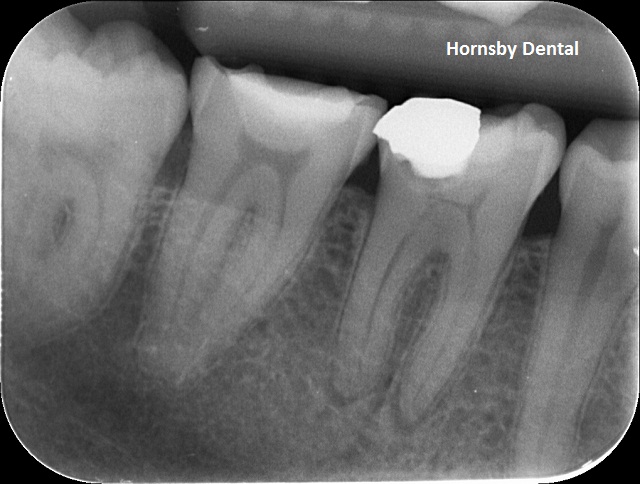
Pre-op: Deep decay underneath old restoration. Previously un-monitored and the tooth was in excruciating pain. Large shadow underneath the opaque white mass is the decay, and at tip of the tooth root is a dark shadow which suggests a zone of infection. The tooth can be saved with a carefully performed root canal therapy and avoid the loss of the tooth.
Measurement
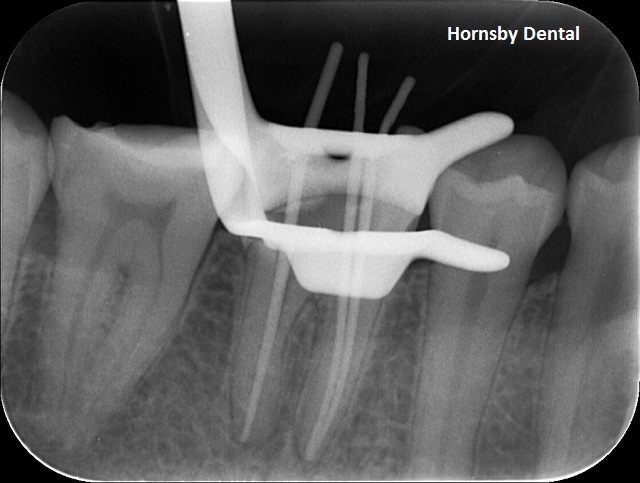
Measurement: The root canal therapy is essentially the treatment to rid infection inside the pulpal/nerve space within the tooth, and to seal the tooth from further reinfection into the root tip of the root. This needs to be performed very carefully and should always have a “rubberdam” isolation field to avoid the re-introduction of bacteria from within the mouth into the canal spaces. Without rubberdam, the treatment is considered compromised. In this image the dentist has used a clamp to lock the rubberdam to the tooth and is measuring the sealing length for the final root filling.
Post-OP
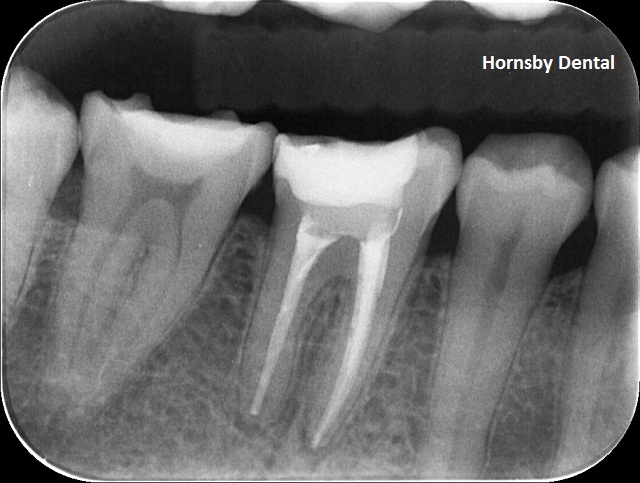
Post-op: A well-obturated/filled root canal therapy. The tooth is symptom-free and will have a crown placed on it to seal the tooth from any potential fracture and decays in it. Studies have shown a well-placed dental crown can provide superior seal and, if possible, should always be placed on the tooth after the root canal therapy is completed with the tooth being symptom-free.
North Sydney Dentistry–Root Canal Therapy Restoration (Dental Crowns)
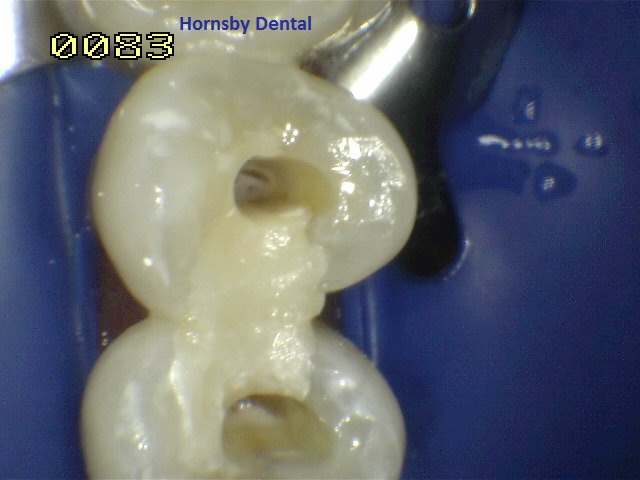
Temporary restoration of teeth that are receiving root canal therapy. Note that these temporary restorations are weak and prone to chipping.
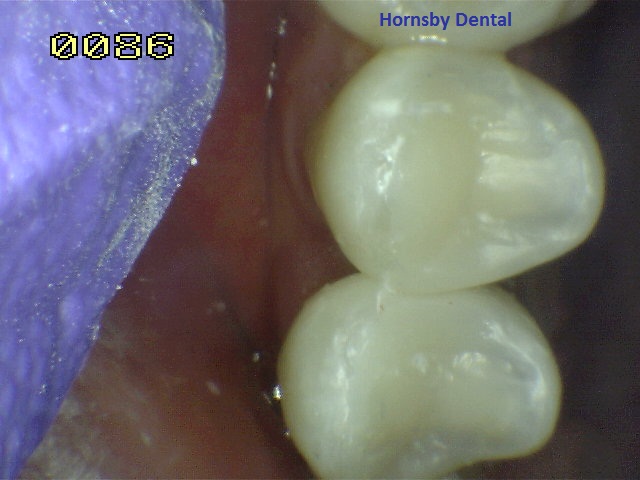
Careful restoration of the teeth with crowns. The teeth have added strength and aesthetics. At North Sydney Dentistry we carefully select our dental lab to ensure high quality work.
To book an appointment or ask us any questions:
Feel free to speak to one of the friendly team at North Sydney Dentistry on 8090 1108, visit our practice at Level 1, Suite 102/71 Walker Street, North Sydney or e-mail us on info@northsydneydentistry.com.au.

